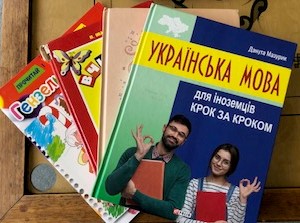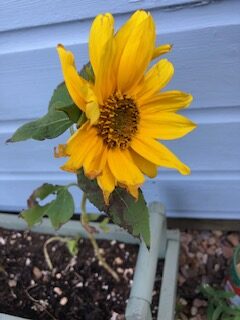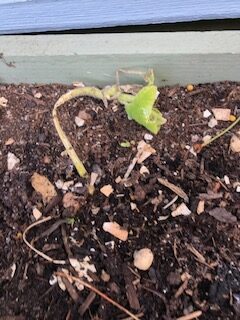Following Mariia’s return, I decided to pick up my Ukrainian studies once more. Having completed the whole of Duolingo, I was feeling rather pleased with myself. Sadly, my confidence was misplaced. Though I’d learned to recognise numerous phrases and plenty vocabulary, I had still barely begun to learn the language. Prescient as always, Mariia returned with a text book and several of her nieces early readers. Having her to direct and guide me was a gift I was not going to ignore, so my battle with this complex language with a whole new alphabet resumed. It was going to be difficult, at times painful, and certainly frustrating, but whenever was learning anything otherwise?
As we grow older, we sometimes eschew the act of learning. We’ve finished school, we’ve sat the exams, we’re good. But as someone who is positively addicted to the process (masochistic tendencies?) I can only say that these trials and small triumphs have given my life much more joy and meaning than almost anything else.
Back to the beginning again
Despite being a naturally inquisitive person who wants to know how to do everything, I have a more pressing reason to torture my grey cells and consume my free hours. MS is a degenerative disease and the only way to combat the incursion of legions on my brain is to rewire it. A wonderful fellow patient in the hospital introduced me to neuroplasticity via a Ted Talk. Here’s a wee video for those new to the concept: https://www.youtube.com/watch?v=dmEOJyWVQj4
Languages have always fascinated me and they have the additional benefit of being really good for your brain. Since we are determined to visit Mariia in Ukraine one day, what better excuse did I need?

Image: Karen Costello-McFeat
These beginners books are more than testing my skills, but I will get there eventually. The text book is sadly only in Ukrainian (hard core teaching), so Mariia must be my guide. But for those of you who are interested, the title says, ‘Ukrainian language for foreigners – step by step’. Now you can speak a little Ukrainian too.
Learning a new craft
At craft club one of our members is learning to crochet. And dexterous tasks are as beneficial as cerebral ones. Needless to say, there is quite a lot of cursing and ‘I can’t do this’ to which we all reply ‘Yes, you can!’
Those of us who are able to crochet, remember very vividly dropping stitches, losing tension and getting in tangles. It is a bit like riding a bike. A lot of falling precedes success, but when that magic moment comes when fingers and hook work in harmony, you know that practice is all you need to master the art.

I’m still rather a novice, but one of our members has confessed to being a bit of an expert. I suspect that my crochet hooks will be coming out of the cupboard as soon as I finish my current project. There is a blanket that I’d like to do and I could do with some help…
Growing
As my obsession with the garden has grown, so has my desire to begin at the plant’s conception. Nursery plants are wonderful and, of course, I indulge from time to time. However, many of these plants are treated with quite toxic chemicals and if I want to maintain my garden as completely organic, I have to grow from seed. Also, that is what they tell me proper gardeners do.
Unfortunately, neither of my parents were too keen on gardening, so I’ve had to learn largely by myself and more often by letting nature guide me. The trial by error approach is a little more time-consuming, but it is a very good way to learn. Failures abound but triumphs are even sweeter as a result.
My dwarf sunflowers below were sourced from a seed swap event and miraculously, six of the seven have grown beautifully.

Sometimes you win …
And sometimes you lose

As a fan of sunflowers, it’s taken me a while to work out how to get them to maturity without the slugs and snails picnicking on them. The trick, it seems, is to grow them in a cold frame or greenhouse until their stems are thick and hairy. Gastropods, it transpires, are no fans of the hirsute.
Teaching difficulties
It is not only learning that is difficult, teaching is too. When you know how to do something effortlessly, trying to show someone how to do it in a way that makes sense is seriously hard.
My husband had mentioned that he wanted to learn to bake bread. ‘Oh, it’s very simple,’ I blithely replied having completely forgotten the years of slightly wonky loaves and the frustratingly vague recipes I used whilst I was learning.
So this weekend, I showed him how, trying to explain at each step why I did what I did. At times, he reminded me of my recalcitrant students. Warning: teaching adults is no easier than teenagers.
Despite the odd moment of losing patience, we made it and were still friends at the end. It took twice as long as usual and I had to restrain myself from taking over. Because that is the trap that is so easy to fall into. Teaching means allowing the other to take their time and work it out.
The result was two very delicious loaves. My husband was duly pleased with his achievements and I with surviving the teaching role. In future, I shall merely supervise until he is confident to do it without me.

So many of us have skills we take for granted that might be helpful to others. While learning is good for us, teaching is too. We are forced to analyse our knowledge and pass it on in an understandable way. I have benefitted from the kindness of so many others whose abilities exceed mine. I hope that if you have some expertise, you will share it also. It may be difficult, but it will certainly be rewarding.
The three part approach
When working on this post, I came across a mini poster I had kept as a reminder that cooking and learning require three essential ingredients: Patience, practice and presence.

Patience to allocate the time and energy required to achieve your objective and the understanding that few things of any worth are achieved in an instant. Any one who has learned an instrument or a language is aware that the process takes years rather than months.
Practice little and often for the best results. Managing one’s goals is important too. If we focus on the achievable and practice regularly, we will almost certainly get there and the buzz we get from success will spur us on. And as our mastery grows, the five minute practice can expand to the forty-five minute one, because it has become a pleasure rather than a chore.
Presence is key to success in all things, but is, I believe, too often ignored. Only when we give our tasks our full attention can we hope for success. If you are trying to learn something new, take care to give yourself adequate time and remove other distractions, or your results may not be what you desire.
As the long summer stretches ahead of us, perhaps it is a good time to learn something new. Or perhaps you could teach someone a skill. The only questions remaining are: What would you like to try? And what are you waiting for?



